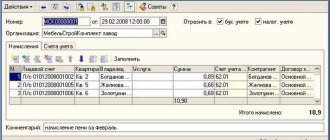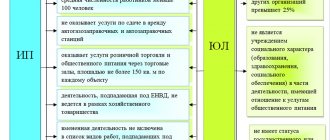From March 4, a new procedure for obtaining a deferment (installment plan) for paying taxes and insurance premiums has been in effect. It was approved by Order of the Federal Tax Service of Russia dated December 16, 2016 No. ММВ-7-8/ [email protected] (hereinafter referred to as Order No. ММВ-7-8/ [email protected] ). At the same time, the predecessor of the named document was declared invalid - Order of the Federal Tax Service of Russia dated September 28, 2010 No. MMV-7-8 / [email protected] The need for amendments is due to the new procedure for administering insurance premiums.
In this regard, the regulations for changing the deadline for payment of tax payments have been extended to insurance premiums; in addition, Order No. ММВ-7-8 / [email protected] has updated the requirements for the composition and content of documents that taxpayers must submit to the inspectorate to obtain a deferment (installment plan) and (or) investment tax credit.
General rules for changing the deadline for paying tax payments
A change in the deadline for payment of a tax, fee, insurance premiums, as well as penalties and fines is considered to be a postponement of the established payment deadline (including an unfulfilled deadline) to a later time.
This transfer is carried out in accordance with Ch. 9 of the Tax Code of the Russian Federation. In particular, the general conditions for changing the deadline for paying tax payments (penalties and fines) are established by Art. 61 Tax Code of the Russian Federation. Thus, clause 2 of the said article provides for a change in the payment deadline in relation to the entire amount or part thereof payable to the budget (debt amount) with the accrual of interest on the debt amount. Moreover, the designated transfer does not cancel the existing one and does not create a new obligation to pay tax (clause 4). In addition, this change can be secured by a pledge of property in accordance with Art. 73 of the Tax Code of the Russian Federation, by guarantee or bank guarantee (clause 5). The tax authorities change the deadline for paying taxes (as well as fees, insurance premiums, penalties and fines) in the manner determined by departmental orders (clause 8 of Article 61 of the Tax Code of the Russian Federation). Currently this is Order No. ММВ-7-8/ [email protected]
Statement
An application for a tax deferral must be submitted in writing. It must indicate:
- total amount of taxes, number of fees;
- punitive (financial) sanctions (fines);
- the amount of penalties that the taxpayer undertakes to pay, the amount of penalties that he asks to be paid in installments;
- deadlines required for payment.
Separately, you need to indicate the amount of money to be paid, the amount of debt, and the payment period that has already expired.
The application must be accompanied by:
- analysis of the financial condition of the subject;
- a list of certificates and evidence that make it possible to verify the existence of a threat of non-payment of taxes or the possibility of its occurrence;
- a schedule according to which the debt will be repaid;
- forecasts of the debtor's income, which can guarantee compliance with the debt repayment schedule.
What are deferments and installments?
Let us remind you: by virtue of paragraph 1 of Art.
64 of the Tax Code of the Russian Federation, deferment (installment plan) for the payment of tax is a change in the deadline for paying tax, if there are grounds established by the Tax Code, for a period not exceeding one year, respectively, with a lump sum or phased payment of the debt amount. When a deferment is granted, the tax is paid at a time, but at a later date (clause 6 of Article 61 of the Tax Code of the Russian Federation), and in the case of installments - not only later, but also in parts (clause 1 of Article 64 of the Tax Code of the Russian Federation). A deferment (installment plan) for the payment of federal taxes in the part credited to the federal budget is provided for a period of one to three years. It can be provided to the taxpayer for one or more taxes (clause 3 of Article 64 of the Tax Code of the Russian Federation). For taxes paid by tax agents, deferment (installment plan) is not provided (clause 9 of Article 61 of the Tax Code of the Russian Federation, Letter of the Ministry of Finance of Russia dated February 15, 2016 No. 03-02-07/1/8000).
An important nuance. The amount for which a deferment (installment plan) for the payment of tax payments is granted cannot exceed the value of the organization’s net assets (clause 2.1 of Article 64 of the Tax Code of the Russian Federation).
Features of the provisions of the Tax Code of the Russian Federation
Providing a deferment or installment payment of tax can be carried out due to the above-mentioned grounds, however, it is worth considering the last point in more detail. The list of reasons that may serve as a basis for granting the right to an installment plan or deferment of tax payment, which is in the Tax Code of the Russian Federation, is quite comprehensive and non-exhaustive. It may have additional clauses in relation to taxpayers. Some of the additions are listed in the Customs Code of the Russian Federation and may apply to perishable goods imported into the Russian Federation; goods that are part of the execution of international agreements and many others.
Who has the right to apply for a deferment (installment plan)?
According to paragraph 2 of Art.
64 of the Tax Code of the Russian Federation, the right to deferment (installment plan) can be used by an interested person whose financial situation does not allow him to pay the said tax on time, but there are sufficient grounds to believe that the possibility of paying the tax will arise during the period for which the deferment is granted. The same norm provides a list of grounds when an interested person can apply for a deferment (installment plan) for the payment of tax payments:
- causing damage to it as a result of a natural disaster, technological disaster or other circumstances of force majeure;
- delay in funding from the budget or delay in payment for a completed government order;
- the threat of his bankruptcy in the event of a lump sum tax payment;
- production or sale of goods, works or services that are seasonal.
So, in accordance with the Tax Code, an organization has the right to apply for a deferment (installment plan) for making tax payments only in four cases.
As for customs VAT (payable in connection with the movement of goods across the customs border of the Russian Federation), an organization can receive a deferment (installment plan) in respect of this tax in cases and in the manner provided for by customs legislation (clause 6, clause 2, article 64 of the Tax Code of the Russian Federation ).
Decision making procedure
The procedure for making a decision on granting the right to defer payment of taxes is a complex and multi-component task. It is connected with the clause on the grounds necessary to obtain the right to an installment plan or deferment of tax payments, which will be discussed in detail below. If we talk about the general situation and procedure, it is important to know that first the subject needs to contact the relevant authorized bodies and find out the list of documents and reasons necessary to obtain this type of right. After this, you should collect the necessary documentation and provide evidence of the existence of the reason that made the subject unable to pay the tax. If there is no significant evidence provided by the authorized bodies in accordance with legislative documents, then there is simply no chance of obtaining the right to defer or installment taxes. With the collected package of documents and application, you must contact the authorities responsible for making such decisions again and submit your request for consideration. After which the subject’s application will be considered by various authorities and authorities, which will determine within a month whether they will or will not provide the right to an installment plan or deferment of taxes.
Rules for obtaining a deferment (installment plan)
As mentioned above, the Federal Tax Service, by Order No. ММВ-7-8/ [email protected], approved a new Procedure for changing the deadline for payment of taxes, fees, insurance premiums, penalties and fines by tax authorities (hereinafter referred to as the Procedure).
This document (as, indeed, its predecessor) regulates the procedure for granting a taxpayer a deferment (installment plan), and also determines the requirements for the composition and content of documents submitted to him for these purposes. Let us say right away: there have been no significant changes in the procedure for obtaining a deferment (installment plan). The procedure for changing the deadline for paying taxes, fees, insurance premiums, penalties and fines established by the Procedure is not much different from the previous rules.
As before, the decision to change the deadline or to refuse to change the deadline for payment of tax payments must be made by the authorized body within 30 working days from the date of receipt of the application of the interested person (clause 15 of the Procedure, clause 6 of Article 64 of the Tax Code of the Russian Federation). A copy of such a decision must be sent to the interested person no later than 3 working days from the date of adoption (Clause 10, Article 64 of the Tax Code of the Russian Federation).
Please note: the decision to grant a deferment (installment plan) for the payment of tax comes into effect from the date indicated in this decision. Penalties due for the entire time from the day established for payment of the tax until the day this decision comes into force are included in the amount of debt if the specified payment deadline precedes the day the decision comes into force. If a deferment (installment plan) is granted on the security of property, the decision to grant it comes into force only after the conclusion of an agreement on the pledge of property in the manner prescribed by Art. 73 of the Tax Code of the Russian Federation (clause 8 of Article 64 of the Tax Code of the Russian Federation).
Clause 17 of the Procedure, clause 1 of Art. 63 of the Tax Code of the Russian Federation defines the authorized bodies and deadlines for providing deferrals (installment plans) by type of tax. For convenience, this information is given in the table.
| Type of tax | The authorized body that makes a decision on deferment (installment plan)* | Deferment period (installment plan) |
| Federal taxes and fees (fines and penalties) credited to the federal budget | Federal Tax Service of Russia | No more than three years |
| Federal taxes and fees (fines and penalties) credited to regional and local budgets | Federal Tax Service of Russia in agreement with the financial authorities of the relevant constituent entities of the Russian Federation and municipalities | No more than one year |
| Insurance premiums | Federal Tax Service of Russia | No more than one year |
| Regional and local taxes | Federal Tax Service of a constituent entity of the Russian Federation, tax authorities at the location of the taxpayer | No more than one year |
* An interested person applying for a change in the deadline for paying federal taxes, fees, insurance premiums, penalties, fines, applies to the Federal Tax Service of Russia through the department of the Federal Tax Service for the constituent entity of the Russian Federation at its location or through the interregional inspectorate of the Federal Tax Service for the largest taxpayers.
An important nuance. At the request of an interested person, the authorized body has the right to make a decision on a temporary (during the consideration of an application for a deferment or installment plan) suspension of payment of the amount of debt by the interested person (paragraph 2 of clause 2 of the Procedure). The interested party must submit a copy of such a decision to the tax authority at the place of his registration within five days (paragraph 2, paragraph 6, article 64 of the Tax Code of the Russian Federation).
Documentation
To obtain a deferment (installment plan), the interested person, in addition to the application, must submit to the authorized body a certain package of documents, the list of which is given in clause 5 of Art. 64 Tax Code of the Russian Federation. Mandatory documents are:
- certificates from banks on the turnover of funds in accounts for each of the six months preceding the submission of the said application, as well as certificates on the availability of settlement documents placed in the card index, or on their absence in this card index;
- bank certificates about cash balances in all bank accounts;
- list of counterparties-debtors. It is necessary to indicate for each debtor the prices of contracts and the terms of their execution, attach copies of these contracts and primary documents on them (invoices, certificates of services rendered (work performed), etc.);
- obligation to comply with the terms of the deferment (installment plan), as well as the expected debt repayment schedule.
In addition to the listed documents, the interested person must additionally submit (clause 5.1 of Article 64 of the Tax Code of the Russian Federation):
- the conclusion of the authority on the fact of a natural disaster (technological disaster) and the assessment report of the damage caused - if the reason for applying for a deferment (installment plan) was damage caused under emergency circumstances;
- information about uncollected amounts of payment for a completed government order (this document can be drawn up either by the manager of budget funds or by the taxpayer himself) - in case of non-receipt of funds from the budget;
- a certificate stating that the share of income from seasonal activities is at least 50% of the organization’s total revenue - if the organization carries out activities that are seasonal in nature.
On pledge, surety and bank guarantee
According to clause 19 of the Procedure, a change in the deadline for payment of taxes, fees, insurance premiums, penalties, and fines can be ensured:
- pledge of property (Article 73 of the Tax Code of the Russian Federation);
- guarantee (Article 74 of the Tax Code of the Russian Federation);
- bank guarantee (Article 74.1 of the Tax Code of the Russian Federation).
In this case, the surety agreement, pledge agreement, and bank guarantee are subject to registration with the tax authority (clause 24 of the Procedure).
To draw up a surety agreement or a pledge agreement, the interested person and the guarantor (or pledgor) must simultaneously submit a written application to the tax authority (clause 20 of the Procedure). Recommended sample statements are given in Appendices 8 and 9 to the Procedure.
The tax authority must notify the interested party (guarantors, pledgors) about the results of consideration of applications for the possibility of concluding the indicated agreements, as well as the results of consideration of the bank guarantee, within seven working days after receiving the relevant documents (clause 23 of the Procedure).
Deferment of payment of fees
Payment of fees may also be delayed. Deferment and installment payment of taxes and fees are indicated in the Tax Code of the Russian Federation. If we talk specifically about installment payments and deferment of fees, then it is important to know that the state fee is also considered a fee. Because of this, the provisions of Chapter 9 of the Tax Code concerning changes in the time limits required for reimbursement of debt on taxes and fees also apply to state duties. The specifics for paying state duty are determined by Chapter 25.3 of the Tax Code.
Grounds for refusal to grant a deferment (installment plan)
Failure to submit the above-mentioned documents is grounds for refusal to grant a deferment (installment plan) for payment of tax payments.
This is stated in paragraph 13 of the Procedure. In addition, in paragraph 1 of Art. 62 of the Tax Code of the Russian Federation names a number of other situations when a taxpayer will definitely be denied a change in the deadline for paying taxes, fees, insurance premiums, penalties, and fines. For example, an organization can hardly count on a positive decision if proceedings are being conducted against it for a tax offense or an administrative offense in the field of taxes, fees, insurance premiums, customs affairs in terms of taxes payable in connection with the movement of goods through customs border of the Customs Union (clause 2, clause 1, article 62 of the Tax Code of the Russian Federation).
Other grounds for refusing to grant a deferment (installment plan) are the following circumstances:
- a criminal case has been initiated on the grounds of a crime related to violation of tax legislation;
- there are sufficient grounds to believe that the interested person is asking for a deferment (installment plan) in order to evade tax collection;
- Three years have not elapsed since the refusal decision was made on the insured person’s previous application for a deferment (installment plan).
The taxpayer must be notified within three days of the authorized body making a refusal decision (clause 2 of Article 62, clause 10 of Article 64 of the Tax Code of the Russian Federation). Such a decision can be appealed to a higher tax authority and then in court or immediately in court (if adopted by the Federal Tax Service of Russia) (clause 2 of article 62, clause 9 of article 64, clause 2 of article 138 of the Tax Code of the Russian Federation).
conclusions
Having considered the above aspects, points and characteristics of the special right to provide an installment plan or deferment of tax payment, it is important to understand that in order to obtain such an opportunity it is necessary to put in a lot of work. You must have a reason that meets the requirements of the Tax Code. It is important to prepare a complete list of necessary documents; you need to be prepared for the fact that they will be clarified by the relevant authorities. It is important to follow the instructions of the authorities that will assist you in obtaining the opportunity to defer payment of taxes.
When will collateral be required?
If an individual deferment (installment plan) is applied for a period of more than 6 months, security must be provided. This may be a pledge of real estate whose cadastral value exceeds the amount of taxes, fees and advance payments for which a preferential payment schedule has been approved. Other options are also possible: a guarantee or a bank guarantee.
In a situation where the period does not exceed 6 months, no security is required.
Select a bank guarantee for free under 44‑FZ and 223‑FZ online







